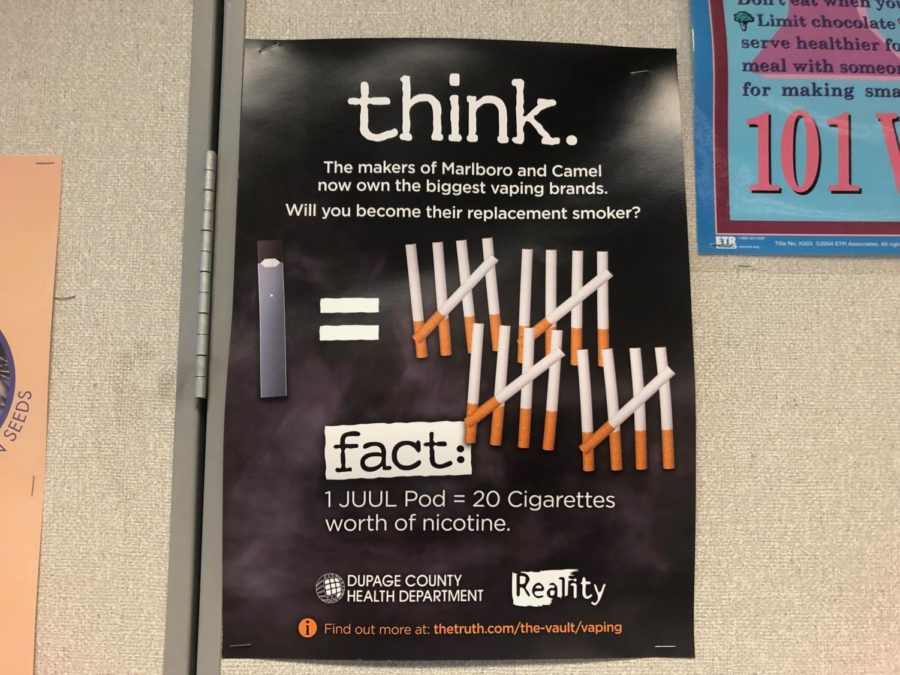Make America vapeless again
The DGS community reflects on how a possible vape ban will impact students.
On Sep. 11, 2019, the Trump administration proposed a flavored e-cigarette ban, taking into consideration the recent deaths that were caused by vaping-related issues and illnesses as well as the increasing number of teens who use vaping products such as JUUL.
According to the deans at DGS, in the last year, there have been 78 infractions related to using and/or possessing nicotine vaping products. So far this year, DGS has had three on record. Associate Principal Karen Taylor is concerned by this issue.
“Vaping is certainly a frequent, almost daily issue that the dean’s office is dealing with, and we have certainly seen it be on the rise for the past few years so it’s something we’re concerned about,” Taylor said.
Sophomore Archer Schutte sees vaping as one of the top issues at DGS, due to lack of information.
“I feel like a lot of students are doing it and they don’t fully understand it. They don’t see the threat and don’t recognize the impact or the danger[s] because they’re so unknown,” Schutte said.
Staff members at DGS are hoping the ban will discourage vape product use. Dean Angela Earwood hopes that if the ban does happen, the use of these products will decrease at our school.
“I’m hoping that it will have a positive impact on less students having access to e-cigarettes. Even though currently the law is you have to be 21 to possess them, we have several students that are able to get ahold of those. Hopefully, if they’re completely banned for anybody then we would see less of it,” Earwood said.
Health teacher Lyndsie Long sees vaping as a concerning issue as well. She hopes that now that we have more facts about how bad vaping is, students will be discouraged from doing it.
“The research wasn’t there two years ago to tell kids that hey this just as bad, if not worse than cigarettes, so now with more research there I hope that kids start to see this. In health class, it’s getting talked about and we can try to put a limit of users hopefully,” Long said.
Sophomore Lily Myszak doesn’t think the ban will be very effective.
“I don’t think banning e-cigarettes, in particular, is going to be a good idea, because these teenagers that are using them on a daily basis, and will be affected the most, are already addicted to nicotine. For a lot of them, the ban will not be so much of a wake-up call or get them to quit. It’s going to get them to try to find nicotine from other places like cigarettes or fake vapes, and it’s just going to open more business for the black market,” Myszak said.
According to Taylor, there are other issues to be taken care of, but in the DGS community vaping is the biggest one.
“Just wearing my kind of administrator hat, and just looking at things that we are dealing with most frequently in our dean’s office at Downers Grove South, e-cigarettes is the place to start,” Taylor said.
While this problem is still being discussed, Michigan, New York, Massachusetts, Rhode Island and California have already banned flavored nicotine vaping products. Illinois, New Jersey and Delaware are considering similar legislation.


Donte • Oct 16, 2019 at 10:34 pm
Obviously there is a legitimate reason to not want vaping in schools. People who are underage should not be possessing these items, especially on school grounds. It poses one question, who does a vaping ban impact more? School aged persons, or people who are old are of age? Are there other ways to prevent people who are underaged from obtaining these items? And if this is to improve the overall health of the general public, why not continue forward and ban cigarettes as well? Just some food for thought.
Sincerely, A Blueprint Alumni.
Clarissa Sigale • Oct 16, 2019 at 8:14 pm
Very interesting, and gives several viewpoints. Cool article!